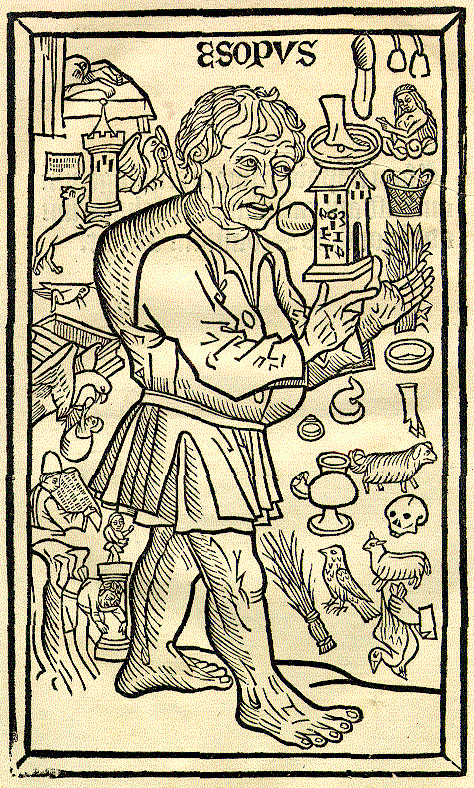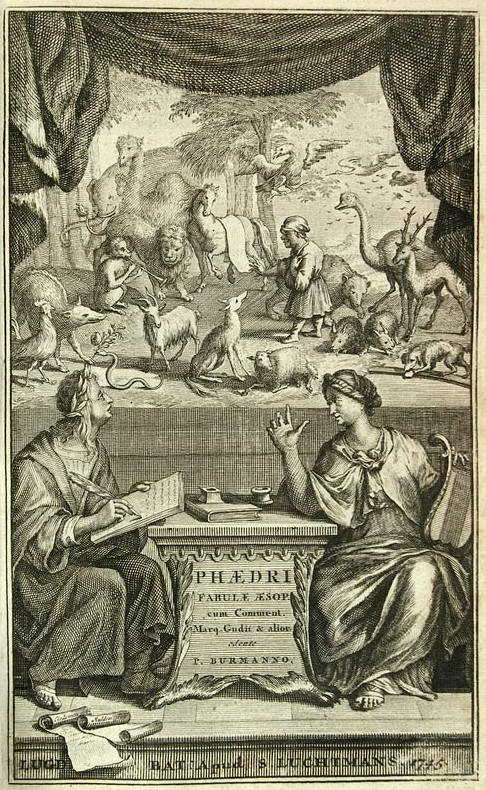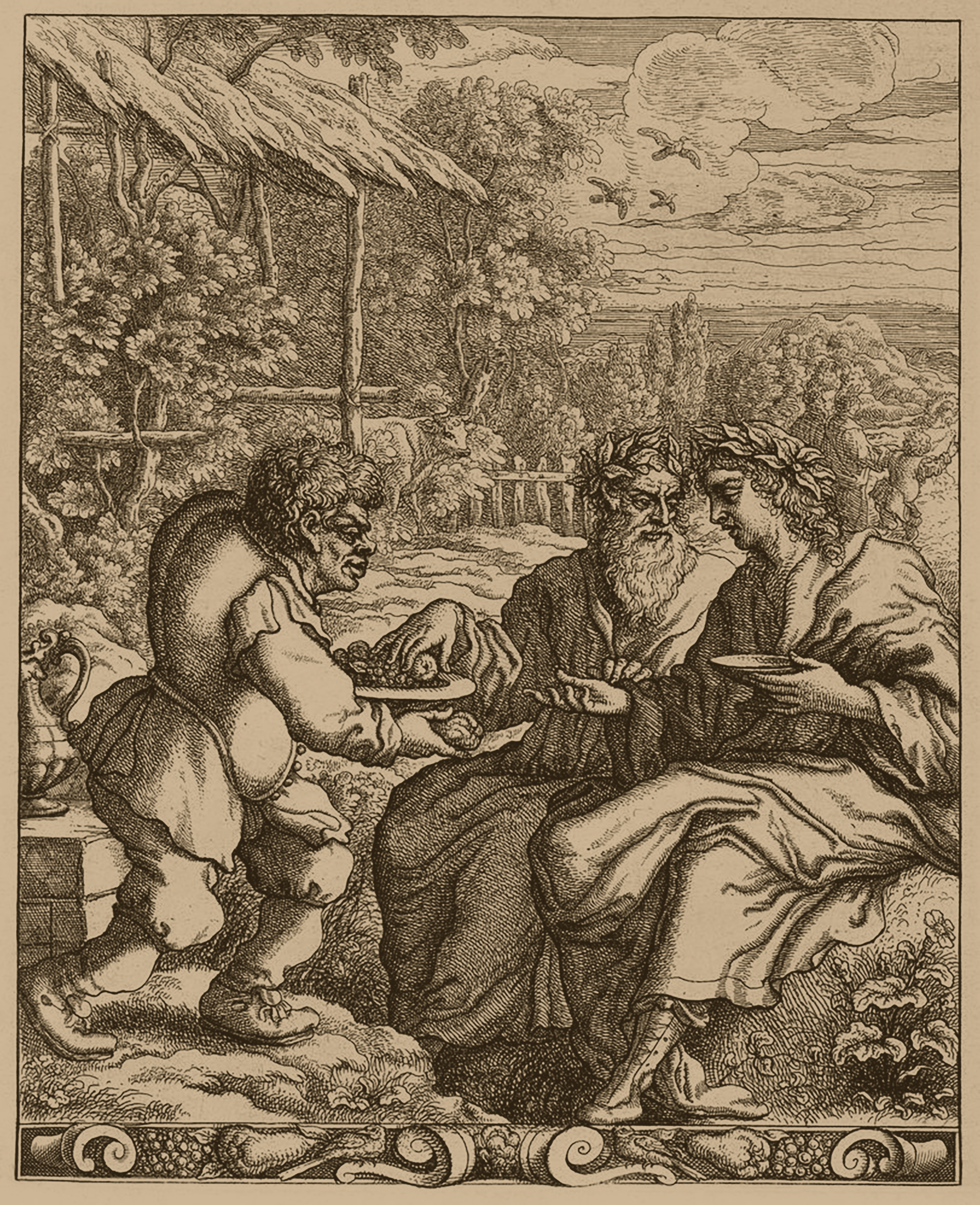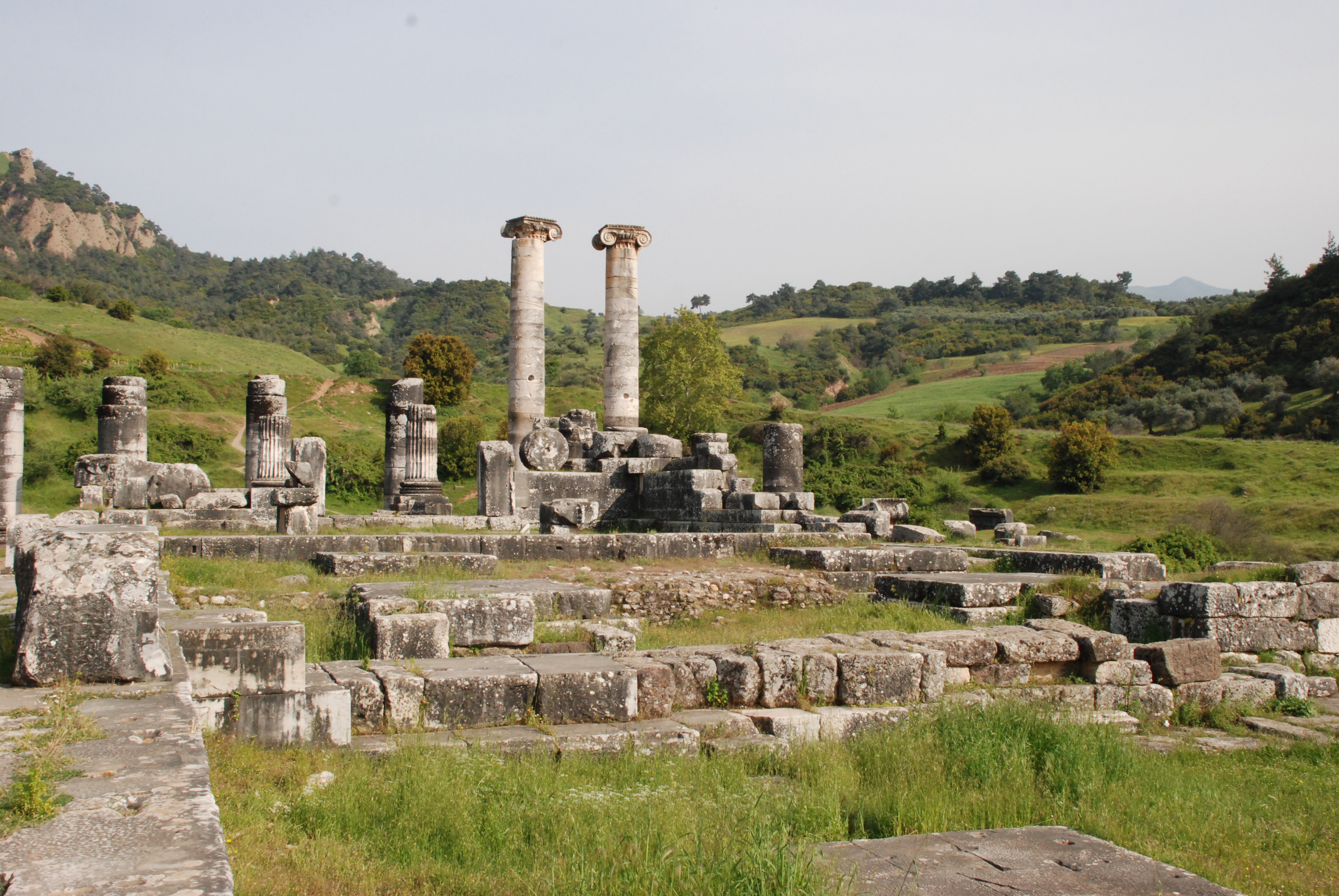|
Æsop
Aesop ( ; , ; c. 620–564 BCE; formerly rendered as Æsop) was a Greeks, Greek wikt:fabulist, fabulist and Oral storytelling, storyteller credited with a number of fables now collectively known as ''Aesop's Fables''. Although his existence remains unclear and no writings by him survive, numerous tales credited to him were gathered across the centuries and in many languages in a storytelling tradition that continues to this day. Many of the tales associated with him are characterized by anthropomorphic animal characters. Scattered details of Aesop's life can be found in ancient sources, including Aristotle, Herodotus, and Plutarch. An ancient literary work called ''The Aesop Romance'' tells an episodic, probably highly fictional version of his life, including the traditional description of him as a strikingly ugly Slavery in Ancient Greece, slave () who by his cleverness acquires freedom and becomes an adviser to kings and city-states. Older spellings of his name have included ... [...More Info...] [...Related Items...] OR: [Wikipedia] [Google] [Baidu] [Amazon] |
Phaedrus (fabulist)
Gaius Julius Phaedrus (; ; Phaîdros), or Phaeder (c. 15 BC – c. 50 AD) was a 1st-century AD Roman Empire, Roman fabulist and the first versifier of a collection of Aesop's fables into Latin. Nothing is recorded of his life except for what can be inferred from his poems, and there was little mention of his work during late antiquity. It was not until the discovery of a few imperfect manuscripts during and following the Renaissance that his importance emerged, both as an author and in the transmission of the fables. Biography The poet describes himself as born in the Pierian Mountains, perhaps in Pydna, and names the Thracians, Thracian musicians Linus of Thrace, Linus and Orpheus as his countrymen. The inscriptions and subscriptions in the manuscript tradition identify him as a ancient Roman freedmen, freedman of Augustus. Some have inferred from these data that Phaedrus was brought to Rome in his childhood as a slave following the Thracian campaign of Lucius Calpurnius Piso Ca ... [...More Info...] [...Related Items...] OR: [Wikipedia] [Google] [Baidu] [Amazon] |
Aesop's Fables
Aesop's Fables, or the Aesopica, is a collection of fables credited to Aesop, a Slavery in ancient Greece, slave and storyteller who lived in ancient Greece between 620 and 564 Before the Common Era, BCE. Of varied and unclear origins, the stories associated with his name have descended to modern times through a number of sources and continue to be reinterpreted in different verbal Register (sociolinguistics), registers and in popular as well as artistic media. The fables were part of oral tradition and were not collected until about three centuries after Aesop's death. By that time, a variety of other stories, jokes and proverbs were being ascribed to him, although some of that material was from sources earlier than him or came from beyond the Greek cultural sphere. The process of inclusion has continued until the present, with some of the fables unrecorded before the Late Middle Ages and others arriving from outside Europe. The process is continuous and new stories are still b ... [...More Info...] [...Related Items...] OR: [Wikipedia] [Google] [Baidu] [Amazon] |
Hellenistic Art
Hellenistic art is the art of the Hellenistic period generally taken to begin with the death of Alexander the Great in 323 BC and end with the Roman Greece, conquest of the Greek world by the Romans, a process well underway by 146 BC, when the Greek mainland was taken, and essentially ending in 30 BC with the conquest of Ptolemaic Kingdom, Ptolemaic Egypt following the Battle of Actium. A number of the best-known works of Greek sculpture belong to this period, including ''Laocoön and His Sons'', ''Dying Gaul'', ''Venus de Milo'', and the ''Winged Victory of Samothrace''. It follows the period of Ancient Greek art, Classical Greek art, while the succeeding Roman art, Greco-Roman art was very largely a continuation of Hellenistic trends. The term ''Hellenistic'' refers to the expansion of Greek influence and dissemination of its ideas following the death of Alexander – the "Hellenizing" of the world, with Koine Greek as a common language. The term is a modern invention; the Hell ... [...More Info...] [...Related Items...] OR: [Wikipedia] [Google] [Baidu] [Amazon] |
Seven Sages Of Greece
The Seven Sages or Seven Wise Men was the title given to seven philosophers, statesmen, and law-givers of the 7th–6th centuries BCE who were renowned for their wisdom Wisdom, also known as sapience, is the ability to apply knowledge, experience, and good judgment to navigate life’s complexities. It is often associated with insight, discernment, and ethics in decision-making. Throughout history, wisdom ha .... The Seven Sages The list of the seven sages given in Plato's ''Protagoras (dialogue), Protagoras'' comprises:''Protagoras'' 342e–343b, trans. R.E. Allen. * Thales, Thales of Miletus () is the first well-known Greek philosopher, mathematician, and astronomer. He was said to be of Phoenician descent. The ancient biographer Diogenes Laertius attributes the aphorism, "Know thyself", engraved on the front facade of the Temple of Apollo (Delphi), Temple of Apollo in Delphi, to Thales,Diogenes Laërtius, i. 40 although there was no ancient consensus on this attrib ... [...More Info...] [...Related Items...] OR: [Wikipedia] [Google] [Baidu] [Amazon] |
Corinth
Corinth ( ; , ) is a municipality in Corinthia in Greece. The successor to the ancient Corinth, ancient city of Corinth, it is a former municipality in Corinthia, Peloponnese (region), Peloponnese, which is located in south-central Greece. Since the 2011 local government reform, it has been part of the Corinth (municipality), municipality of Corinth, of which it is the seat and a municipal unit. It is the capital of Corinthia. It was founded as Nea Korinthos (), or New Corinth, in 1858 after an earthquake destroyed the existing settlement of Corinth, which had developed in and around the site of the ancient city. History Corinth derives its name from Ancient Corinth, a city-state of antiquity. The site was occupied from before 3000 BC. Ancient Greece Historical references begin with the early 8th century BC, when ancient Corinth began to develop as a commercial center. Between the 8th and 7th centuries, the Bacchiad family ruled Corinth. Cypselus overthrew the Bacchiad f ... [...More Info...] [...Related Items...] OR: [Wikipedia] [Google] [Baidu] [Amazon] |
Periander
Periander (; ; died c. 585 BC) was the second tyrant of the Cypselid dynasty that ruled over ancient Corinth. Periander's rule brought about a prosperous time in Corinth's history, as his administrative skill made Corinth one of the wealthiest city states in Greece. Tall poppy syndrome#Etymology, Several accounts state that Periander was a cruel and harsh ruler, but others claim that he was a fair and just king who worked to ensure that the distribution of wealth in Corinth was more or less even. He is often considered one of the Seven Sages of Greece, men of the 6th century BC who were renowned for centuries for their wisdom. (The other Sages were most often considered to be Thales, Solon, Cleobulus, Chilon, Bias of Priene, Bias and Pittacus of Mytilene, Pittacus.) Life Family Periander was the second tyrant of Corinth and the son of Cypselus, the founder of the Cypselid dynasty. Because of his father, he was called Cypselides (Κυψελίδης). Cypselus’ wife was named Cr ... [...More Info...] [...Related Items...] OR: [Wikipedia] [Google] [Baidu] [Amazon] |
Croesus
Croesus ( ; ; Latin: ; reigned: ) was the Monarch, king of Lydia, who reigned from 585 BC until his Siege of Sardis (547 BC), defeat by the Persian king Cyrus the Great in 547 or 546 BC. According to Herodotus, he reigned 14 years. Croesus was renowned for his wealth; Herodotus and Pausanias (geographer), Pausanias noted that his gifts were preserved at Delphi. The fall of Croesus had a profound effect on the Greeks, providing a fixed point in their calendar. "By the fifth century at least", James Allan Stewart Evans, J. A. S. Evans has remarked, "Croesus had become a figure of myth, who stood outside the conventional restraints of chronology." Name The name of Croesus was not attested in contemporary inscriptions in the Lydian language. In 2019, D. Sasseville and K. Euler published a research of Lydian coins apparently minted during his rule, where the name of the ruler was rendered as ''Qλdãns''. The name comes from the Latin language, Latin transliteration of the Greek ... [...More Info...] [...Related Items...] OR: [Wikipedia] [Google] [Baidu] [Amazon] |
Lydia
Lydia (; ) was an Iron Age Monarchy, kingdom situated in western Anatolia, in modern-day Turkey. Later, it became an important province of the Achaemenid Empire and then the Roman Empire. Its capital was Sardis. At some point before 800 BC, the Lydian people achieved some sort of political cohesion, and existed as an independent kingdom by the 600s BC. At its greatest extent, during the 7th century BC, it covered all of western Anatolia. In 546 BC, it became a Lydia (satrapy), satrapy of the Achaemenid Empire, known as ''Sparda'' in Old Persian. In 133 BC, it became part of the Roman Republic, Roman Asia (Roman province), province of Asia. Lydian coins, made of electrum, are among the oldest in existence, dated to around the 7th century BC. Geography Lydia is generally located east of ancient Ionia in the modern western Turkish provinces of UÅŸak Province, UÅŸak, Manisa Province, Manisa and inland Ä°zmir Province, Ä°zmir.Rhodes, P.J. ''A History of the Classical Greek ... [...More Info...] [...Related Items...] OR: [Wikipedia] [Google] [Baidu] [Amazon] |
Maximus Of Tyre
Maximus of Tyre (; fl. late 2nd century AD), also known as Cassius Maximus Tyrius, was a Greek rhetorician and philosopher who lived in the time of the Antonines and Commodus, and who belongs to the trend of the Second Sophistic. His writings contain many allusions to the history of Greece, while there is little reference to Rome; hence it is inferred that he lived longer in Greece, perhaps as a professor at Athens. Although nominally a Platonist, he is really a sophist rather than a philosopher, although he is still considered one of the precursors of Neoplatonism. Writings The Dissertations There exist 41 essays or discourses on theological, ethical, and other philosophical subjects, collected into a work called ''The Dissertations''. The central theme is God as the supreme being, one and indivisible though called by many names, accessible to reason alone: In such a mighty contest, sedition and discord, you will see one according law and assertion in all the earth, that there ... [...More Info...] [...Related Items...] OR: [Wikipedia] [Google] [Baidu] [Amazon] |
Sardis
Sardis ( ) or Sardes ( ; Lydian language, Lydian: , romanized: ; ; ) was an ancient city best known as the capital of the Lydian Empire. After the fall of the Lydian Empire, it became the capital of the Achaemenid Empire, Persian Lydia (satrapy), satrapy of Lydia and later a major center of Hellenistic Greece, Hellenistic and Byzantine Greeks, Byzantine culture. Now an active archaeological site, it is located in modern day Turkey, in Manisa Province, near the town of ''Sart, Salihli, Sart''. History Sardis was occupied for at least 3500 years. In that time, it fluctuated between a wealthy city of international importance and a collection of modest hamlets. Early settlement Sardis was settled before 1500 BC. However, the size and nature of early settlement is not known since only small extramural portions of these layers have been excavated. Evidence of occupation consists largely of Late Bronze Age and Early Iron Age pottery which shows affinities with Mycenaean Greece and ... [...More Info...] [...Related Items...] OR: [Wikipedia] [Google] [Baidu] [Amazon] |
Callimachus
Callimachus (; ; ) was an ancient Greek poet, scholar, and librarian who was active in Alexandria during the 3rd century BC. A representative of Ancient Greek literature of the Hellenistic period, he wrote over 800 literary works, most of which do not survive, in a wide variety of genres. He espoused an aesthetic philosophy, known as Callimacheanism, which exerted a strong influence on the poets of the Roman Empire and, through them, on all subsequent Western canon, Western literature. Born into a prominent family in the Greek city of Cyrene, Libya, Cyrene in modern-day Libya, he was educated in Alexandria, the capital of the Ptolemaic dynasty, Ptolemaic kings of Egypt. After working as a schoolteacher in the city, he came under the patronage of King Ptolemy II Philadelphus and was employed at the Library of Alexandria where he compiled the ''Pinakes'', a comprehensive catalogue of all Greek literature. He is believed to have lived into the reign of Ptolemy III Euergetes. Altho ... [...More Info...] [...Related Items...] OR: [Wikipedia] [Google] [Baidu] [Amazon] |










